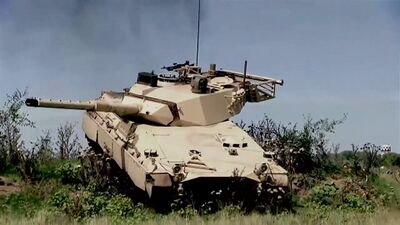Mangusta Main Battle Tank: Difference between revisions
No edit summary |
No edit summary |
||
| Line 58: | Line 58: | ||
* [[Mako Light Tank]] | * [[Mako Light Tank]] | ||
[[Category: Temuair | [[Category: Luminerra/Temuair Relations]] | ||
Revision as of 04:54, 20 October 2020
| T-77 Xabarín | |
|---|---|
 | |
| Type | Tank |
| Place of origin | |
| Service history | |
| In service | 1977 - 2008 |
| Used by | Imperial Army of Temuair |
| Production history | |
| Manufacturer | Armachd |
| Specifications | |
| Weight | 30.5 t (30.0 long tons; 33.6 short tons) |
| Length | 6.75 m (22 ft 2 in) |
| Width | 3.25 m (10 ft 8 in) |
| Height | 2.42 m (7 ft 11 in) |
| Crew | 4 |
| Armor | Protection from up to 20 mm projectiles along the frontal arc, 35 mm of all around armor protection for the turret. |
Main armament | 1 x Brais Roi Arsenal CT-105/77 105 mm cannon |
Secondary armament | 1 x AU-71C 7.65×53 mm coaxial machine gun AP-37 12.7x81 mm machine gun mounted on the turret roof |
| Engine | AEM 833-V6 diesel engine |
| Suspension | Torsion-bar |
Operational range | 590 km (370 mi), 800 km (500 mi) with auxiliary fuel tanks |
| Speed | 75 km/h (47 mph) |
The T-77 Xabarín is a light tank designed and developed by Armachd of Temuair, and based on the VCI-74 chassis. It was in service with the Imperial Army of Temuair since 1977 and was retired in 1998 in favor of the OTL-91, the import designation for the Pequeñoyan Mako Light Tank. The T-77 continued to serve with the Imperial Navy of Temuair Marine Infantry until 2008, until it to was replaced by the OTL-91
History and design
In the mid-1980's, the Imperial Army initiated a program to modernize many of the VCI-74 and variant vehicles systems. This included upgrades mostly revolving around improved electronics and equipment. One of the most important additions is that of an Auxiliary Power Unit (APU) mounted on the back of the tank. The externally mounted APU allows for lower fuel consumption and quieter operation when static by allowing the vehicle and its systems to be operated with the vehicle main engine turned off. In addition, the turrets hydraulic system was replaced with an all-electric design, increasing traverse speed. Automatic fire suppression systems were added to both the fighting and engine compartments. Improvements were also made to the vehicles optics and senors, including providing the drivers station with a short-range thermal camera, while the gunner and commanders stations received more sophisticated thermal imaging equipment with built-in laser rangefinder. The on-board computer systems received extensive upgrades both internally, including a new meteorological processing unit working with the fire control computer to account for weather conditions, thereby improving the accuracy of long range fire, and externally by way of new digital monitors and gauges replacing analog components.
Some upgrades were specifically developed from this program for the T-77, primarily focusing around the vehicles cannon. The vehicles prior 2-axis stabilization system has been replaced by a new and modern laying and stabilizing system. The new system allows the temporary locking of the gun into position in order to allow the loader to insert a new shell, while the aiming system still keeps track of the target. Once loading is completed, the main gun is put back on target by the targeting system. Previously, it was nearly impossible for the gun to be reloaded while the turret was in motion, the new system allows the cannon to be reloaded while tracking a target, increasing the accuracy and speed of follow on fire.
Operational history
Retirement
Variants
- T-77: Initial production version
- T-77A: Upgrade package introduced in the mid 1980's
- T-77B: Features the new Brais Roi Arsenal CT-120/86 in addition to electronics and sensors upgrades first announced in 1989. This version was not accepted into service.